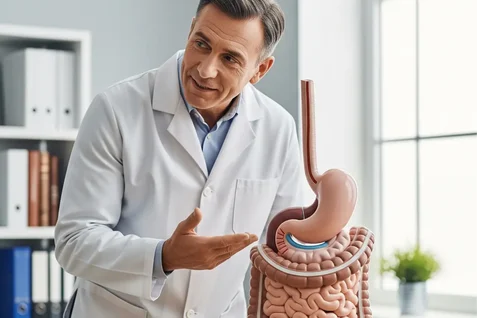Gastroenterología
Cualquier afección sobre el sistema digestivo y los órganos que lo conforman, tiene un espacio reservado en este servicio.
Cuidado de las vías digestivas
El tratamiento de enfermedades del tracto gastrointestinal, así como los análisis que confirman el buen funcionamiento de todos sus órganos y estructuras; forman parte de esta importante especialidad médica.
La comprensión detallada de la fisiología de cada órgano, permite comprender de la mejor manera cuál deberá ser su comportamiento natural.
La digestión como proceso principal de este sistema, permite reconocer la importancia de cada elemento y su correcta interacción.


Endoscopia digestiva
En gastroenterología, la técnica endoscópica se ha convertido en un instrumento preciso para el diagnóstico y tratamiento de diversas condiciones.

Criterio amplio y preciso
El estudio completo, exhaustivo y conciso de las condiciones presentes a lo largo de la vía digestiva, favorece una oportuna toma de decisiones.

El Especialista
Se encuentra ampliamente formado para analizar, estudiar, diagnosticar, corregir o tratar diversas patologías; empleando a su favor los beneficios de la endoscopia.
Preguntas frecuentes
Antes que nada, al igual que ocurre en otras especialidades médicas que implican la atención y tratamiento de sistemas complejos; la gastroenterología posee distintas ramas de estudio:
Gastroenterología Pediátrica
Básicamente se trata de la integración armoniosa entre las especialidades de gastroenterología y pediatría tradicional. Como resultado de esta fusión, se adquiere una formación precisa para el tratamiento de patologías gastrointestinales presentes en la población infantil; las cuales difieren en buena forma a las manifestaciones que desarrollan estas enfermedades en el adulto.
Además, son profesionales especializados no solo en la aplicación de diversas pruebas diagnósticas, sino también en la interpretación asertiva de los resultados; logrando en consecuencia actuar de manera oportuna para beneficio del paciente pediátrico.
Hepatología
Por su parte, las enfermedades hepáticas conforman un grupo bastante complejo a tratar; en el cual se reúnen las afecciones del hígado, páncreas y vesícula biliar.
En consecuencia, ya sea hepatitis en sus diversas manifestaciones (de origen viral o no), hígado graso, cirrosis e incluso las enfermedades metabólicas del hígado; forman parte de las enfermedades tratadas por esta subespecialidad. Del mismo modo, condiciones más severas como el trasplante de hígado y el tratamiento de tumores o cáncer en este tipo de tejidos; son algunas de las principales áreas de acción en las que se desempeña un hepatólogo.
Endoscopia digestiva
Indiscutiblemente, la endoscopia digestiva (también llamada gastroscopia) es una técnica empleada con fines diagnósticos y terapéuticos; cuya relevancia y campo de acción continúa ampliándose en la medida que se desarrollan nuevas tecnologías.
Por esta razón, existen especialistas que se dedican de manera exclusiva al estudio y tratamiento aplicado a través de un endoscopio; con el cual es posible identificar todo tipo de patologías presentes desde el esófago hasta el duodeno. Igualmente, gracias a que este instrumento permite la visualización directa y la introducción de componentes que facilitan los cortes o toma de muestras (biopsia); es en extremo útil al momento de requerirse, por ejemplo, la extirpación de pólipos.
- Colonoscopia. El método más efectivo para diagnosticar el cáncer de colon; consiste en introducir el instrumento desde el recto y hasta el colon.
- Enteroscopia. Estudio específico para el análisis del intestino delgado.
- Esofagogastroduodenoscopia. El esófago, estómago y duodeno son estructuras únicas en el cuerpo humano que deben ser analizadas en búsqueda de cualquier problema que pueda producir sangrado digestivo u otroas complicaciones.
- Rectosigmoidoscopia. Se ocupa de analizar el colon sigmoides y el recto para identificar enfermedades en este punto del cuerpo.
- Anoscopia. Para revisar en detalle problemas en el ano y recto; en donde es posible aplicar procedimientos terapéuticos locales.
Sin duda, partiendo del conocimiento del campo de acción de esta especialidad; el gastroenterólogo se encuentra en capacidad de atender todo tipo de situaciones que afectan el esófago, estómago, intestinos, hígado, páncreas, apéndice, recto y ano.
En primer lugar, al igual que ocurre con otras áreas de la salud; la atención preventiva ocupa un rol privilegiado tanto en la detección temprana, como evitando el desarrollo de enfermedades perfectamente evitables.
En este sentido, a la hora de hacer que el paciente aumente sus probabilidades y cuente con alternativas de tratamiento más precisas; es determinante el momento en el cual es detectada la enfermedad (especialmente ante la presencia de casos complejos y/o de rápida evolución, como el cáncer).
Por otra parte, al momento de conocer su diagnóstico, la visita con el especialista debe convertirse en una rutina ineludible.
En tanto que las técnicas aplicadas ayudarán con la administración de los tratamientos que el paciente precisa; también es posible hacer el monitoreo permanente de la evolución del caso clínico para conocer de qué manera viene respondiendo el organismo.
Finalmente, también cabe la visita con el especialista cuando los pacientes ya se encuentran avanzados y en condiciones delicadas de salud. Para ello, además de brindar todo el profesionalismo en su área de especialización; también procurará el mayor bienestar y mejorar las condiciones de vida del individuo.
Para ello, es probable que trabaje de manera conjunta y cooperativa con otras disciplinas que forman parte de nuestro cuerpo médico; de manera que el paciente reciba un trato único y especial.